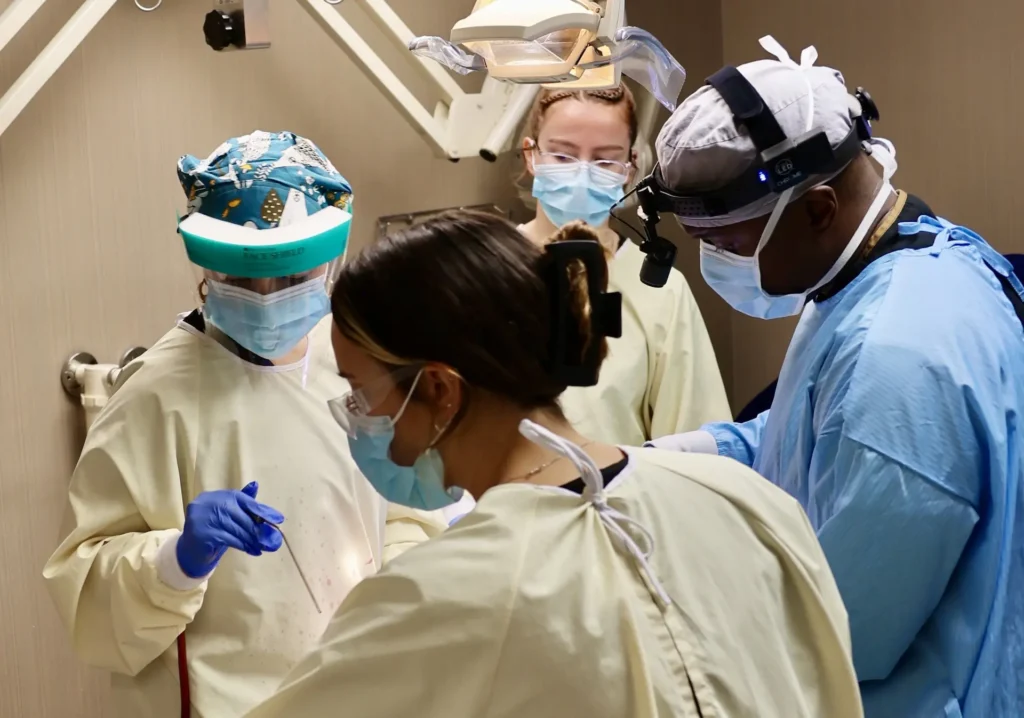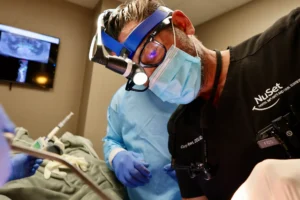Dental implants are one of the most reliable ways to replace missing teeth. They look natural, feel comfortable, and can last a lifetime. With a success rate of over 95%, it’s no surprise that millions of people choose them every year.
In rare cases, infections can develop around the implant. If left untreated, this can affect your gums, bone, and the implant itself. It’s important to recognize the signs of an infection early. Read on to understand what to look for and what to do if you notice something isn’t right.
Key Takeaways
- Pain, swelling, or a loose implant are early signs that let you know if a dental implant is infected.
- Poor oral hygiene and certain health conditions increase the risk.
- Early treatment with antibiotics or professional cleaning can save the implant.
- Good oral hygiene and regular check-ups help prevent infections.
What Is a Dental Implant Infection?
A dental implant infection happens when bacteria build up around the implant site. While the implant itself can’t decay like a natural tooth, the surrounding gums and bones are still at risk.
The infection usually starts in the gum tissue around the implant. If it isn’t treated, it can spread to the bone that holds the implant in place. This condition is called peri-implantitis, and it can weaken the implant’s support over time.
One challenge with dental implant infections is that they can go unnoticed at first. In the early stages, you might only feel slight discomfort or see mild swelling. But if bacteria continue to spread, the signs become more serious.
Signs That Your Dental Implant May Be Infected

An infected dental implant doesn’t always cause obvious symptoms at first. But as the infection worsens, your body will show clear signs. Here are the key symptoms to watch for so you can act quickly and protect your health.
Pain When Chewing or Touching
Some soreness after getting an implant is normal. But if the pain doesn’t improve or gets worse, it could be a sign of infection. You might feel sharp pain when you chew or even when you gently touch the implant. Persistent discomfort is your body’s way of telling you something isn’t right.
Loose Implant
A dental implant should feel stable, just like a natural tooth. If it starts to feel loose or wobbly, it’s a red flag. Infections can cause bone loss around the implant, making it unstable. If you notice any movement, contact your dentist immediately.
Fever and General Malaise
Your body fights infections by raising its temperature. If you develop a fever or start feeling unwell, it could be due to an infection. Fatigue, chills, or aches can also indicate that your body is working overtime to fight off bacteria.
Bad Breath or a Bad Taste
An infection often causes a buildup of bacteria and pus around the implant. This can cause constant bad breath or a sour taste in your mouth that doesn’t go away, even after brushing. If you notice this, see your implant specialist as soon as you can.
Swollen, Red, or Bleeding Gums
Healthy gums around an implant should look firm and pink but some swelling immediately after the implant procedure is normal. If the swelling persists or bleeds easily, it could mean bacteria is irritating the tissue.
Discharge
Disharge around the implant site is a clear sign of infection. It might look like a white or yellow discharge. This is your body’s way of fighting the bacteria, but it also means the infection has progressed. Don’t wait—this requires professional care.
Causes of Dental Implant Infection
While dental implants are safe, certain factors can increase your risk of infection. Here are the most common causes of dental implant infections.
Poor Oral Hygiene
Good oral hygiene is key to keeping your dental implant healthy. If you don’t brush, floss, or clean around the implant properly, bacteria can build up. Over time, this bacteria can infect the gums and bone around the implant, causing inflammation and infection.
Underlying Health Conditions
Certain health conditions can make you more prone to infections. If you have diabetes, gum disease, or a weakened immune system, your body may struggle to heal after the implant procedure. This creates an opportunity for bacteria to cause an infection.
Peri-Implantitis
As already established in the article, peri-implantitis is a specific type of infection that affects the tissue and bone around the implant. It starts with inflammation in the gums and can cause bone loss if left untreated. Poor oral hygiene is the most common cause, but other factors like smoking can also increase your risk.
Poor Surgical Technique
A successful dental implant procedure requires precision and care. And this is what we’re all about at NuSet Dental Implants and Oral Surgery. If the implant isn’t placed correctly or if the area becomes contaminated during surgery, bacteria can take hold. That’s why it’s so important to choose a skilled and experienced dentist.
How to Prevent Dental Implant Infection
Prevention is the best way to protect your dental implant and keep your gums healthy. With the right care and habits, you can lower the risk of infection and ensure your implant lasts for years.
Here’s what you can do to prevent dental implant infection:
Follow post-operative instructions
After your implant procedure, your dentist will give you specific care instructions. These may include avoiding hard or crunchy foods, using a soft-bristle toothbrush, and rinsing with a prescribed mouthwash. Follow these steps carefully to help the area heal and stay clean.
Have a good oral hygiene
Keeping your mouth clean is essential. Brush at least twice a day with a soft toothbrush, floss using waterpik gently around the implant, and consider using an antibacterial mouth rinse. These simple habits remove bacteria and prevent plaque buildup that could lead to infection.
Schedule regular check-ups
Routine dental visits allow your implant specialist to monitor your implant and catch any issues early. Regular cleanings and check-ups are especially important if you have underlying health conditions or are prone to gum problems.
Avoid smoking
Smoking slows down healing and increases your risk of infection. If you smoke, consider quitting or at least avoiding it during the healing process. This will help your implant integrate properly and keep the surrounding tissues healthy.
How to Treat a Dental Implant Infection
If you suspect your dental implant is infected, don’t wait. Early treatment can stop the infection from spreading and save your implant. Here’s how infections are typically diagnosed and treated.
Diagnosis
The first step is to visit your specialist. They will examine the implant site for signs of infection, like swelling, redness, or discharge. An X-ray may also be done to check for bone loss or other damage around the implant. This helps your dentist understand how severe the infection is.
Treatment Options
- Antibiotics: In many cases, antibiotics can clear up the infection. Your dentist may prescribe oral antibiotics or recommend a special rinse to reduce bacteria around the implant.
- Professional Cleaning: Deep cleaning around the implant helps remove plaque, bacteria, and infected tissue. This is especially important if the infection is caught early.
- Surgical Intervention: If the infection has caused significant damage, more advanced treatment may be needed. This could include cleaning the infected area or, in rare cases, removing and replacing the implant.
The sooner you act, the better. Left untreated, the infection can spread to your gums, bones, or even other parts of your body. This can make treatment more complicated and put your implant at risk.
When to See Your Dental Specialist
While some discomfort after your procedure is normal, certain symptoms should never be ignored.
If you notice any of the following, it’s time to call your dentist:
- Pain that doesn’t improve or gets worse is a clear warning sign.
- Gums that stay swollen, red, or tender for more than 6 days could signal infection.
- Any fluid or discharge coming from the implant site is not normal and needs immediate attention.
- If your implant feels unstable or wobbly, it could mean bone loss around the area.
- A fever, chills, or general fatigue can be a sign your body is fighting an infection.
Get Infection-Free Dental Implants at NuSet Dental Implants and Oral Surgery!
Dental implants are built to last, but infections can threaten their success. If you notice pain, swelling, or a loose implant, it’s time to act fast. Ignoring the signs can lead to bigger problems.
NuSet Dental Implants and Oral Surgery provides expert care to keep your dental implants infection-free and secure. Our skilled team knows how to spot and treat infections early, helping you protect your smile in the long run.
Don’t let an infection ruin your dental implant. Contact us now to schedule a visit and get the care you need for a healthy, confident smile.
Frequently Asked Questions
How can you tell if a dental implant is going bad?
A loose implant, discharge, or persistent bad breath are also clear indicators that something is wrong.
How common are dental implant infections?
Infections are rare, with dental implants having a success rate of over 95%. However, poor oral hygiene, smoking, or health conditions can increase the risk.
Can an implant infection go away on its own?
No, implant infections don’t heal on their own. Without proper treatment, the infection can spread and cause bone loss, leading to implant failure.
How do you treat an infected tooth implant?
Treatment of infected tooth implants may include antibiotics, professional cleaning, or, in severe cases, minor surgery to clean the area. Early diagnosis is key to saving the implant. If you notice any signs, contact your specialist immediately.





